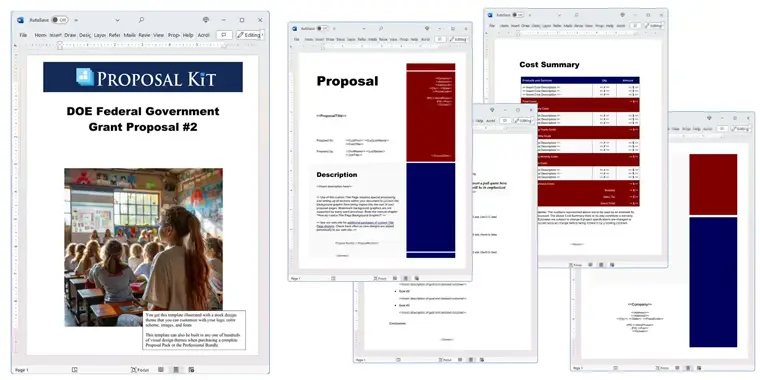How to write your DOE Federal Government Grant Proposal #2
We include this 18 page layout with every Proposal Pack. If you want this template to have a different visual design theme than the one illustrated here, purchase any Proposal Pack design and create this template using the purchased design theme. This template is included in every Proposal Pack. If you get a Proposal Pack or the Professional Bundle, you can also make any variation of this template with different chapters to suit your needs.
We typically include more chapters in the templates than most people will need to give everyone more variety in the chapters they may need. You can trim down a long template by removing pages you do not need or combining multiple chapter topics into one page.
 DOWNLOADABLE, ONE-TIME COST, NO SUBSCRIPTION FEES
DOWNLOADABLE, ONE-TIME COST, NO SUBSCRIPTION FEES![]() View DOE Federal Government Grant Proposal #2
View DOE Federal Government Grant Proposal #2
This sample proposal is based on the same layout as this template and is included in every Proposal Pack. The visual design of the templates will match whichever Proposal Pack design you purchase. To get this template in a different design theme than shown in the sample, purchase any other Proposal Pack design theme and this template will be included.
You can create an editable Word version of this sample in any design theme of your choice including branded to your logo.
 If you need this template on DVD media order from our Amazon shop.
If you need this template on DVD media order from our Amazon shop.
You can also create countless variations of this document to suit your needs using the included library of 2200+ chapters if ordering a Proposal Pack or Pro Bundle.
 What Our Clients Say
What Our Clients SayI used your Proposal Pack Wizard to do a proposal for a company that wanted two web sites, and I got the job. The same week I also sent an e-mail proposal, made without the wizard, for another job and I didn’t get it."
Editor-Writer-Webmaster
Related Article
Related Video
Related Templates
- DOE Federal Government Grant Proposal
- Educational Grant Proposal #2
- Grant Proposal for Special Needs Support
- Daycare Preschool Grant Funding Proposal
- STEM Educational Program Proposal
- Orphanage Non-Profit Funding Support Proposal
- Educational Grant Proposal
- Non-Profit Parenting Distance Learning and Workshop Proposal
- Computer Lab for Students Educational Proposal
- Distance Learning Education Proposal
- Science Lab for Students Educational Proposal
- HHS Federal Government Grant Proposal
- USDA Federal Government Grant Proposal
- New College Curriculum Proposal
- Educational Grant Proposal 2
- EPA Federal Government Grant Proposal 2
- DOJ Federal Government Grant Proposal 2
- DOH Federal Government Grant Proposal
- HHS Federal Government Grant Proposal 2
- DOJ Federal Government Grant Proposal
- School Funding Request Proposal
- EPA Federal Government Grant Proposal
- Educational Training for Special Needs Proposal
- School Improvement Project Proposal
What's the best way to write your DOE federal government grant proposal?
A proven way to write an effective DOE federal government grant proposal is by using the Proposal Kit template and software package. This comprehensive toolkit simplifies the complex process of proposal writing, providing structured templates and software that guide you through every step of the process. Whether you're looking to secure a grant for educational initiatives, such as implementing an NEH grant, Proposal Kit equips you with the tools necessary to create a persuasive, professional proposal.
If you need to write a DOE federal government grant proposal, consider whether you're experiencing challenges like understanding the intricate requirements, managing tight deadlines, or simply starting from scratch. The Proposal Kit can provide the structure and guidance to navigate these hurdles effectively.
What Types of Projects Are DOE Federal Government Grant Proposals Written For?
DOE federal government grant proposals are critical documents that request funding to support a wide range of educational projects. These documents must be meticulously written to meet specific criteria and demonstrate how the project aligns with the goals of the Department of Education.
All federal grants have unique requirements, meaning no one-size-fits-all template exists. Every grant requires a custom document to match the RFP instructions. This is where Proposal Kit shines, as you have a library of thousands of chapters to pick from to create a bespoke template. There is also a manual included on how to respond to federal grant RFPs using the Proposal Kit. The template illustrated here is just one example of how the Proposal Kit was used to respond to a specific RFP.
Here are some types of projects typically proposed:
- Develop and implement new curricula in public schools.
- Research studies focused on improving educational outcomes.
- Training programs for teachers and educators.
- Technology integration in classrooms to enhance learning.
- Initiatives aimed at reducing educational disparities.
- Programs supporting special education and inclusive learning.
- Community outreach and educational programs.
- Construction or renovation of educational facilities.
- Development of STEM (Science, Technology, Engineering, and Math) programs.
- Cultural and historical education projects.
Chapters this template is built with
These templates are just an example of how one grant was responded to. A federal grant RFP often includes forms you need to integrate into your proposal. Proposal Kit makes this easy by allowing you to insert placeholder pages into which to insert forms. Depending on the complexity of the forms, you might add them once they are all converted to PDF format.
By leveraging Proposal Kit's comprehensive suite of tools and templates, you can ensure that each section of your DOE federal government grant proposal is not only complete but also presented in a professional, persuasive manner. This structured approach can significantly increase your chances of success in the competitive arena of government grants.
Cover Sheet
The cover sheet is crucial as it is the first page reviewers will see. It should contain the project title and contact information and any other critical details that identify the proposal, such as the proposal number and submission date. The design must be clean and professional, reflecting the seriousness of your intentions. Proposal Kit templates ensure that this section is well-organized and aesthetically pleasing, setting a positive tone for the reviewers right from the start.
Abstract
The abstract is a brief overview of the proposal, usually limited to a single paragraph. It should encapsulate the essence of the project, what it aims to achieve, and why it is significant. The clarity and conciseness of the abstract are paramount, as it sets the stage for the detailed proposal to follow. Proposal Kit helps structure this section to be impactful, ensuring that the project's importance and feasibility shine through effectively.
Goals and Objectives
This section should clearly define what the project intends to accomplish. Goals are broad statements of what the proposal hopes to achieve, while objectives are measurable and specific steps that will be taken to reach these goals. Proposal Kit provides templates that help you articulate these elements clearly and straightforwardly, enabling reviewers to quickly understand your project's aims.
Design
In the design section, you detail the methodology and strategies that will be used to achieve the project's goals. This might include the approach to project management, tools and technologies to be used, and a step-by-step process breakdown. Using Proposal Kit templates, you can outline these elements logically and organized, demonstrating thorough planning and a clear vision.
Project Background
Provide a context for your project by explaining the need or problem your project addresses. Include any historical background, previous research, or data supporting your project's necessity. Proposal Kit helps frame this narrative coherently, linking it to the broader goals and demonstrating the project's foundation on solid research or identified needs.
Project Management
Detail the organizational structure of the project team, the project timelines, and the management strategies you will employ. This section reassures funders of your project's feasibility and your team's ability to manage and implement it effectively. Proposal Kit's templates allow you to present this information clearly and professionally, enhancing your proposal's credibility.
Evaluation
Describe the evaluation methods you will use to measure the success of your project. Specify the performance metrics, data collection methods, and analysis procedures. Funders need to know what you plan to achieve and how you will assess performance and impact. Proposal Kit templates help you detail your evaluation strategy in a comprehensive and convincing manner.
Dissemination
This section should outline how the project results will be shared with a broader audience. This could include publications, workshops, conferences, or online platforms. Dissemination is crucial for projects aimed at broader educational impacts. The Proposal Kit assists in structuring this plan so that it clearly articulates how the project outcomes will be communicated and utilized.
Project Budget
A detailed budget is essential for any proposal. Use Proposal Kit's line item quoting database system to provide a detailed summary of expected costs. This can include direct costs like personnel and equipment and indirect costs like administrative support. The clarity in this section can often make or break the proposal's success.
Partnerships
If your project involves collaboration with other organizations, this section should detail each partner's roles and contributions. Highlighting each partner's strengths and resources can significantly enhance the project's appeal. Proposal Kit's templates help you organize and present these details effectively, ensuring that the project's collaborative nature is clear and compelling.
Worksheets
Worksheets are practical tools for organizing data and ensuring all aspects of your proposal are thought through and documented. They can help structure timelines, responsibilities, or budget details. Proposal Kit includes various worksheets that can be adapted for different parts of the proposal, ensuring thorough preparation and presentation.
Appendices
Finally, appendices serve as a place to include supplementary material that supports your proposal but is too detailed for the main text. This can consist of tables, graphs, additional data, or biographies of key personnel. Using Proposal Kit templates, you can ensure that this supplementary material is well-organized and professionally presented, providing depth to your proposal without cluttering the main sections.
Use cases for this template
Jackson's Victory
Jackson, the founder of History Helpers, a small startup focused on enhancing history education, discovered the complexity of grant writing when he decided to apply for an NEH grant. His goal was to integrate World History into the curriculum of local schools, an ambitious project that required significant funding. Without prior experience in drafting such detailed documents, Jackson felt overwhelmed.
However, upon discovering the Proposal Kit, he found a lifeline. The software offered him many templates that covered every possible section of his proposal, from the cover sheet to detailed budget plans. Using these templates, Jackson meticulously wrote each part of his proposal, ensuring it met all the stringent criteria set by the grant.
His efforts paid off when he received confirmation that his project had been funded. Jackson credits Proposal Kit not just for the ease with which he could compile the proposal but also for educating him on the depth and breadth required in grant applications.
Sophia Beats the Clock
Sophia, a project manager at InnovateEd Tech, faced a critical challenge when her boss assigned her the task of writing a DOE federal government grant proposal with only a few weeks until the submission deadline. The project aimed to incorporate cutting-edge technology into public school STEM programs, and the proposal needed to convincingly reflect the innovative nature of their project.
Sophia turned to Proposal Kit, which provided structured templates that streamlined the organization of her proposal. To ensure the proposal was comprehensive and aligned with the company's vision, Sophia utilized an AI writing tool to assist in drafting specific sections. The AI tool analyzed the content of the company's website to maintain consistent messaging, highlighting InnovateEd Tech's expertise in educational technology. Thanks to the combined capabilities of the Proposal Kit and the AI enhancements, Sophia submitted the detailed, persuasive proposal on time, ultimately securing the grant.
Liam's Non-Profit Initiative
Liam, serving as the director of Community Educate, a non-profit dedicated to educational equity, needed to secure funding through a DOE grant to support a new community outreach program. This program was designed to bring educational resources and workshops to underserved areas, aiming to bridge the gap in educational opportunities.
Understanding the importance of a well-structured proposal, Liam employed the Proposal Kit to organize and articulate his project's details, from its foundational design to a meticulous budget. The Proposal Kit's comprehensive nature allowed him to clearly outline the project's objectives, the methods of implementation, and the expected outcomes, making a compelling case for the value and impact of the initiative.
The clarity and precision of the Proposal Kit templates helped Liam communicate the depth of his project's potential, leading to successful funding. Liam praised Proposal Kit for assisting him in presenting his non-profit's vision effectively, ultimately enabling them to expand their reach and impact within the community.
Conclusions and Recommendations
The challenge of writing a DOE federal government grant proposal can be efficiently managed with the Proposal Kit. This toolkit simplifies the process and enhances the quality of your proposals, making them more likely to succeed. The structured templates and software guide you through each section, ensuring nothing is missed. A well-prepared proposal is critical to securing funding and bringing your projects to fruition.
Also Known As
This template may also be referred to in different ways or be used in more specialized situations, such as:
- Department of Energy Grant Application
- DOE Funding Request Proposal
- Federal Energy Grant Proposal
- DOE Research Grant Application
- Energy Department Funding Proposal
- DOE Project Grant Submission
- Federal Government Energy Grant Application
- DOE Grant Request Document
- U.S. Department of Energy Funding Proposal
- DOE Grant Application Form
Abstract
 Writing a DOE federal government grant proposal can be a complex and demanding task. It involves navigating specific cost principles and federal statutes to ensure all project costs are eligible and within the allowable costs. Federal funding can be vital for projects, but it requires precise documentation and adherence to the federal agency's guidelines. The Proposal Kit offers a structured approach to writing these proposals, providing templates that simplify the process, from establishing the project's objectives to detailing the anticipated expenditures and income. This toolkit can help applicants create a case for their projects, whether they're seeking funds for educational improvements, technology integration, or community outreach initiatives.
Writing a DOE federal government grant proposal can be a complex and demanding task. It involves navigating specific cost principles and federal statutes to ensure all project costs are eligible and within the allowable costs. Federal funding can be vital for projects, but it requires precise documentation and adherence to the federal agency's guidelines. The Proposal Kit offers a structured approach to writing these proposals, providing templates that simplify the process, from establishing the project's objectives to detailing the anticipated expenditures and income. This toolkit can help applicants create a case for their projects, whether they're seeking funds for educational improvements, technology integration, or community outreach initiatives.
The Proposal Kit allows for efficient organization of federal funds and program income, ensuring clarity in how project costs will be managed. Each proposal section, from the cover sheet to the appendices, is vital for securing financial assistance. The principal investigator must manage the proposal's content, ensuring that the funding opportunity aligns with the grant program's goals and that all federal award requirements are met. This involves cost sharing and detailed descriptions of equipment owned, real property, and other resources that contribute to the project's success.
Applicants must consider the project's gross income and interest earned, detailing how these funds will support the project's objectives. The Proposal Kit aids in determining the scope and scale of the project's impact, providing a clear narrative supported by evidence and data. Additionally, the toolkit assists in outlining how the project will generate interest and engagement, using services like technical assistance to strengthen the proposal.
 In terms of financial management, the Proposal Kit helps applicants document expenditures, reimbursements, and payments. It includes guidance on retaining ownership of project outcomes, such as license fees and royalties, ensuring compliance with federal statutes. The toolkit also supports collaborations with contractors and other recipients, detailing each entity's role and contributions to the project's completion.
In terms of financial management, the Proposal Kit helps applicants document expenditures, reimbursements, and payments. It includes guidance on retaining ownership of project outcomes, such as license fees and royalties, ensuring compliance with federal statutes. The toolkit also supports collaborations with contractors and other recipients, detailing each entity's role and contributions to the project's completion.
Overall, the Proposal Kit serves as an invaluable resource for those navigating the intricacies of federally funded grant proposals. It encourages thorough preparation, helping applicants present a well-structured and convincing proposal that stands a better chance of securing the necessary financial backing for innovative and impactful projects.
In preparing a DOE federal government grant proposal, it is crucial to follow established guidelines and cost principles to ensure all project costs align with federal requirements. One must carefully document allowable costs, which include both direct expenses like personnel and equipment and indirect costs such as administrative support. Using the Proposal Kit can significantly streamline this process, providing templates that guide the incorporation of necessary details, such as program income and cost share. This ensures that the proposal comprehensively addresses the scope of the project and its anticipated financial needs.
 To enhance the proposal's effectiveness, it's important to clearly define the project's objectives and the real property or improvements involved. This includes detailing any technical assistance required and the methods for achieving project goals. The principal investigator should be responsible for the accurate documentation of all financial topics, including cash payments and reimbursements, ensuring these do not exceed the approved budget or percentage allocated by the federal agency.
To enhance the proposal's effectiveness, it's important to clearly define the project's objectives and the real property or improvements involved. This includes detailing any technical assistance required and the methods for achieving project goals. The principal investigator should be responsible for the accurate documentation of all financial topics, including cash payments and reimbursements, ensuring these do not exceed the approved budget or percentage allocated by the federal agency.
Moreover, the Proposal Kit supports the inclusion of additional information, such as interest earned, rebates, and royalties, demonstrating how these contribute to the project's financial structure. It assists in highlighting the project's potential for generating gross income and the use of funds provided, thereby underscoring the project's sustainability and long-term impact.
The grant proposal should also emphasize partnerships with other recipients and contractors, noting each entity's contributions to the project. This collaborative approach can enhance the proposal's credibility, as it showcases a wide array of expertise and resources. The Proposal Kit provides the necessary tools for reporting and documenting these collaborations, ensuring compliance with federal statutes and agency guidelines.
 The proposal should address the dissemination of results and project reports, detailing how findings will be shared with a broader audience to maximize the project's impact. This could involve publications, workshops, or online platforms, all planned to retain stakeholder interest and support. Through meticulous preparation and the use of Proposal Kit resources, applicants can present a case that not only meets but exceeds federal funding requirements, thereby securing the financial assistance needed to bring their innovative projects to fruition.
The proposal should address the dissemination of results and project reports, detailing how findings will be shared with a broader audience to maximize the project's impact. This could involve publications, workshops, or online platforms, all planned to retain stakeholder interest and support. Through meticulous preparation and the use of Proposal Kit resources, applicants can present a case that not only meets but exceeds federal funding requirements, thereby securing the financial assistance needed to bring their innovative projects to fruition.
Frequently Asked Questions
What are the eligibility requirements for a DOE grant?
Eligibility requirements for DOE grants typically include criteria such as organizational type (e.g., academic institutions, non-profits, private companies), project focus areas, and compliance with federal regulations. It's essential to thoroughly review the RFP to ensure your organization and project meet these requirements. Contacting the grant officer for clarification can be beneficial if there is any uncertainty.
How should I structure my proposal to meet the DOE's guidelines?
The DOE usually provides detailed guidelines on structuring your proposal, including sections such as an executive summary, project description, budget, and supporting documents. Following these guidelines ensures your proposal is organized and meets the DOE's expectations, making it easier for reviewers to find and evaluate the required information. Select Proposal Kit chapters matched to what the RFP requests.
What evaluation criteria will the DOE use to assess my proposal?
The DOE evaluates proposals based on innovation, project impact, feasibility, and alignment with DOE priorities. Understanding these criteria helps you tailor your proposal to emphasize these aspects. Articulating how your project addresses each criterion and provides significant benefits can enhance your proposal's competitiveness. Use a Compliance Matrix to ensure you have covered everything required in the RFP.
What supporting documents and data should I include with my proposal?
Supporting documents often include a detailed budget, resumes of key personnel, letters of support, and any preliminary data or research findings relevant to your project. These documents provide essential context and validation for your proposal. Ensuring that all required documents are complete and well-organized is crucial for a strong submission.
How do I effectively demonstrate the impact and feasibility of my proposed project?
Demonstrating impact and feasibility involves clearly outlining the potential benefits of your project, its innovative aspects, and a practical implementation plan. Providing concrete examples, preliminary results, and a detailed project timeline can help convey this effectively. Highlighting partnerships, previous successes, and the expertise of your team also strengthens the case for your project's potential success.
15% Off Discount
![]() Add To Cart This Word Template Only
Add To Cart This Word Template Only
 Add To Cart Proposal Pack for Government Grants
Add To Cart Proposal Pack for Government Grants
 Add To Cart Proposal Kit Professional Bundle
Add To Cart Proposal Kit Professional Bundle
 4.7 stars, based on 846 reviews
4.7 stars, based on 846 reviewsProposal Kit chapters used in this template
Cover Sheet, Title Page, Table of Contents, Abstract, Goals and Objectives, Design, Project Background, Project Management, Evaluation, Dissemination, Project Budget, Partnerships, Worksheet, Appendix A, Appendix B, Appendix C, Appendix D, Back Page
Included Calculator Spreadheets
These Excel calculator spreadsheets are included with this template. If you purchase a Proposal Pack or the Professional Bundle, these proposal pages are generated using an automated line-item database in the included Wizard software. The calculator spreadsheets are intended for use when purchasing only the static Word template.
You use this proposal for
- Non-technical proposal
- Service sales proposal
- Project pitch proposal
- RFP response
- Federal government grant proposal
How to create this template with Proposal Pack Wizard
You can create this document using any of the logo-designed Proposal Packs. Pick any Proposal Pack with a logo design theme you like best; they will all work equally well. The Proposal Pack for Any Business is the pack with no extra added logos or colors - designed to be used plain or for you to customize with your logos and graphics.
The Proposal Pack design theme you purchase will determine the visual look of this template. The screenshot above only shows the plain generic design theme. Names and stories in examples are fictional; however, the templates are from real client use cases.
We include a library of chapters to be assembled based on your needs. All proposals are different and have different needs and goals. We designed Proposal Pack so you can customize the documents to suit your needs.
You will best create this document using the Proposal Pack Wizard - Expert Edition software to select this template and build it in the Proposal Pack logo design theme of your choice along with any desired customizations (such as adding additional chapters, removing unneeded chapters, changing the order of chapters, and importing your company logo). This template outlines a proposal for the described situation. Each user is responsible for typing in the actual content of the provided pages with their information to complete the proposal. Suggestions in the abstract may include features in higher-end packages and are facilitated by the selection of chapter templates to support the narrative of each proposal, which help guide the user in filling in the details.
You create this template using the Wizard software with an entire Proposal Pack library and software. We include the Expert Edition of the software in the Proposal Kit Professional bundle. Microsoft Word for Windows is required to use the customizing software. You can also edit Word document templates in other office software such as Word for Mac. We will assist Mac users in assembling complex templates for their first project if they do not have the required platform to run the Wizard software.
You only get the single assembled Word document if purchased as a stand-alone template. The individual template products include no other templates, samples, or software.
How to Build Templates Featured on Proposal Kit Website
Many people find the Proposal Kit website after searching for a specific proposal. Once you've purchased and installed the software, how do you build that template you found in the first place? This video shows you how to build any proposal you see on the Proposal Kit website.
Key Takeaways
- The DOE Federal Government Grant Proposal #2 is available as a ready-to-edit template.
- You can create unlimited custom variations of this template using a Proposal Pack or the Professional Bundle.
- Using a Proposal Pack or Professional Bundle, you can automate quotes and other financial pages with a line-item database.
- There are no ongoing subscription fees. You get lifetime unlimited use.
- We made Proposal Kit for freelancers, small businesses, and non-profits.
- Proposal Kit product content (templates, samples, software) is 100% written by humans.
 Ian Lauder has been helping businesses write their proposals and contracts for two decades. Ian is the owner and founder of Proposal Kit, one of the original sources of business proposal and contract software products started in 1997.
Ian Lauder has been helping businesses write their proposals and contracts for two decades. Ian is the owner and founder of Proposal Kit, one of the original sources of business proposal and contract software products started in 1997.By Ian Lauder
 Published by Proposal Kit, Inc.
Published by Proposal Kit, Inc.


 Cart
Cart


 Get 15% off ordering today:
Get 15% off ordering today: 

 Facebook
Facebook YouTube
YouTube X
X Search Site
Search Site